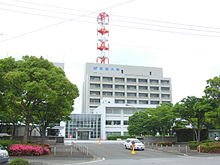- The Open University of Japan
-
The Open University of Japan 放送大学 Motto Whenever, Wherever, Whoever, Established Founded 1981
Chartered 1983Type Private President Dr.Yoichi Okabe Undergraduates 80,799 (2007) Postgraduates 6,245 (2007) Location Wakaba, Mihama-ku, Chiba City, Chiba, Japan Campus Urban (learning centers) Member of ICDE and AAOU Website www.ouj.ac.jp The Open University of Japan (放送大学 Hōsō Daigaku, formerly The University of the Air) is a distance learning university which has students all over Japan; it accepted its first students in 1985.
Although founded by the national government initiative with a single-issue law and heavily subsidised by the government, it was established by The University of the Air Foundation (放送大学学園 Hōsō Daigaku Gakuen) as a "special academic incorporation" (特別な学校法人 tokubetsu na gakkō hōjin), the University classified as a private university in Japan.
It had founded on the basis system of The Open University in the United Kingdom. The administration is based in Chiba City although it has offices and learning centers in each of Japan's 47 prefectures. The University offers accredited undergraduate and graduate degrees.
With nearly 90,000 students enrolled (in 2007), 45,000 students graduated from the University. It is one the largest academic institutions in the nation, and qualifies as one of the world's mega universities. Since it was founded, over 780,000 students have taken courses from the institution.
The English name of the university was changed on 1 October 2007.
Contents
OUJ as a broadcasting station
The OUJ Academia broadcasts lectures and administrative announcement programs. It owns terrestrial television and radio broadcasting stations at the headquarters in Chiba City. All programs are recorded and edited at the headquarters and transmitted from the Tokyo Tower via UHF television and FM radio, and relayed at Maebashi, Gunma to reach Kantō region as well as hired Communications Satellite(CS) broadcasting channels to reach the whole nation. The broadcasts are exclusively in Japanese language as the medium of instruction. Article 50-4-1 of the Broadcasting Act prohibits the OUJ from broadcasting commercial messages. The cost of broadcasting system is subsidised by the national budget.
It is not affiliated with any other broadcasting networks (although there were supports from television stations in Tokyo at the beginning). As a television station it is the only purely independent/isolated terrestrial station in Japan.
Broadcast media
Media Call sign Broadcasting area Television JOUD-(D)TV Tokyo, Kanagawa, Saitama, Chiba, Gunma, Ibaraki and Tochigi FM Radio JOUD-FM Tokyo, Kanagawa, Saitama, Chiba, Gunma, Ibaraki and Tochigi Satellite (SKY PerfecTV!) — Nationwide Reception is free to general public.
Television: Analog 16 (Tokyo), Analog 40 (Maebashi), Digital 28 (Tokyo・Maebashi).
Radio: 77.1MHz FM (Tokyo), 78.8MHz (Maebashi).
CS: SKY PerfecTV! nationwide. No contract charge or subscription fees are charged at OUJ-only recipients. Some cable television and cable radio also re-transmit the broadcasts.
See also
References
External links
35°39′13″N 140°03′00″E / 35.653587°N 140.050085°ECoordinates: 35°39′13″N 140°03′00″E / 35.653587°N 140.050085°E (main office)
Broadcast television in Kantō region NHK Tokyo - NHK Broadcasting Center: broadcast across Kanto - 1 (1) · Digital exclusive service: Ibaraki - Mito - 1Tokyo - NHK Broadcasting Center - 2 (3)Regional Non-profitOpen Univ. - 12 (16) (Not available on 1seg)Prefectural Sort By abbreviationBy callsignCategories:- Chiba geography stubs
- Kantō university stubs
- Open universities
- Private universities in Japan
- Television stations in Japan
- Japanese radio
- Education in Chiba Prefecture
- Independent television stations in Japan
Wikimedia Foundation. 2010.

